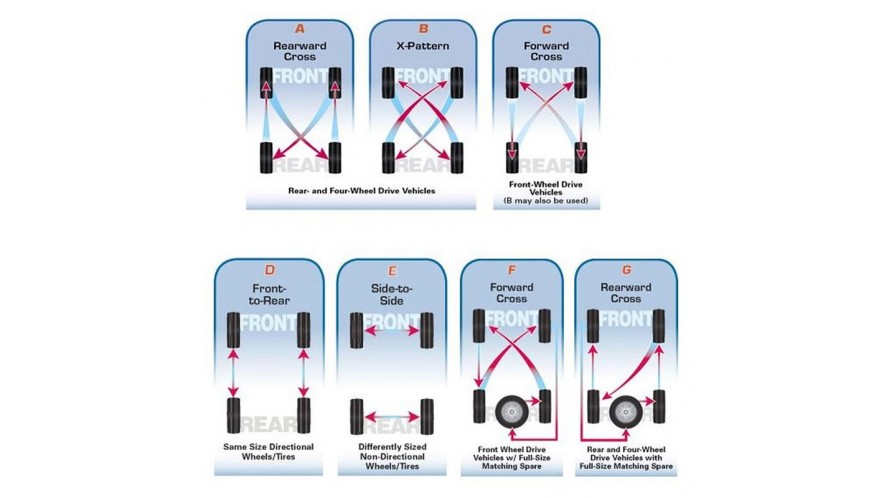
The Importance of Tyre Rotation
The Importance of Tyre Rotation
Is tyre rotation necessary? You may think this isn’t worth the effort or you might not be aware this is a routine vehicle service requirement. Let us explain why you MUST do regular tyre rotations and what can happen if you don’t.
What Is Tyre Rotation?
Tyre rotation is a maintenance protocol that allows vehicle owners to:
- Maximise the life of their tyres.
- Reduce risks associated with uneven tyre wear.
Rotation increases safety and saves money because tyres that wear evenly are less prone to damage and will last longer.
Tyre wear and tear is a normal and unavoidable consequence of driving. Because most cars are front-engined the front axle carries a heavier load than the rear when this is combined with the disproportional force placed on front tyres by braking and steering, it is normal for front tyres to wear quicker than rear. There are many other causes of uneven wear such as:
- Turning left. Most interchanges and ramps require left turns causing the right front tyre to wear faster than the left.
- Sidewall damage . Conversely the sidewalls on left tyres are more likely to be bumped or damaged against pavements creating asymmetric sidewall wear.
- Braking. Heavy, sudden and frequent braking related to specific driving conditions or inclines and declines can significantly increase front tyre wear.
- Road condition. Potholes and road surfaces cause irregular and asymmetric wear.
Tyres will always wear differently according to their position on a vehicle, the objective of frequent rotation is to try ‘spread’ this irregular wear as equally as possible across all tyres. It is difficult to completely manage all factors that contribute to tyre wear but it is possible to easily improve safety and tyre life through rotation and inspection.
Why Must Tyres be Rotated?
Simply put by rotating your tyres all you are promoting even tread wear which in turn extends tyre life, improves handling and reduces noise or vibrations. Rotation is how you as a vehicle owner can with little effort or cost have a positive impact on your vehicle safety, running costs and ride comfort.
Certain tyre brands offer mileage and damage warranties and in order to validate these benefits regular rotation within manufacturer specifications is a mandatory requirement without which these warranties will lapse.
Regularly rotating your tyres is also the right time for a professional inspection to assess any damage, tread depths, air pressures or to rebalance wheels.
During rotation each tyre is moved to a different position on the car axles, this changes how each tyre wears and by interrupting this pattern your tyres are ‘used up’ more evenly. Refer to your vehicle manual or consult with auto care experts to confirm how often you should rotate tyres . Dependent on vehicle type we recommend this is done every 8 000 – 10 000km or at least twice a year if you drive less.
What If I Don’t Rotate?
Without rotation, tyre tread can wear in a way that creates a potentially unstable driving surface. This type of wear may increase the possibility of heat buildup, hydroplaning, poor traction, compromised brake response and will create a greater chance of punctures and blowouts.
Inadequate tread depth is responsible for more than 25% of all tyre-related car accidents and in excess of 60% of all vehicles currently on the road have at least one tyre with insufficient or uneven tread potentially causing:
- Heat Buildup. When moving, the friction created between the tyres and road generates heat. Tyres are designed to withstand high heat levels but do require cooling airflow that the correct depth tread facilitates, excessive heat can contribute to failures such as blowouts and tread separation.
- Hydroplaning. Deep grooves in healthy tyre tread channel water away from the driving surface, so the tyre can maintain grip on the road. Without adequate tread depth, tyres will skim across surface water instead of gripping the road which compromises steering, handling and overall control.
- Traction and Braking Performance. Irregular wear can create areas of inadequate grip on the tread where traction or braking can be compromised leading to loss of vehicle control.
- Punctures and Blowouts. A spot on a tyre experiencing excessive strain could begin to wear thin, the thinner this spot gets the bigger the chance that a foreign object like a nail or sharp stone could penetrate causing a puncture.
Value Tyre & Fitment stores offer FREE rotation and balancing for the life of all tyres bought from us.
